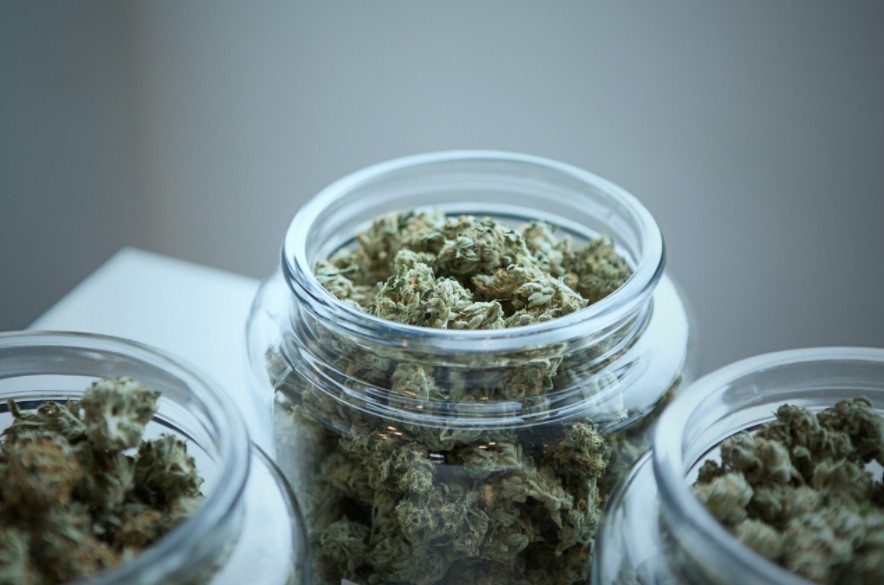

Cannabigerolic acid, or CBGa for short, is the chemical precursor to both THC and CBG. Delta 8 THC on the other hand is a non-psychoactive cannabinoid that acts as an anti-inflammatory and may possibly inhibit cancer cell proliferation. Our bodies naturally produce small amounts of CBG gummies and Delta 8 THC in order to maintain internal homeostasis (balance). However, when consumed orally in supplement form their therapeutic potential can be greatly improved.
Both cannabinoids are nearly identical in structure; both contain cyclic aliphatic tail attached to a propyl group instead of a pentyl (5 carbon) group like THCa (Delta 9 THC). Unlike Delta 9 THC, CBG and Delta 8 THC don’t bind to the CB1 or CB2 cannabinoid receptor sites that are responsible for psychoactive effects. This is because they lack a pyran (6 carbon) ring which helps the cannabinoids fit perfectly into the lipid membrane of neurons to cause ‘lock and key’ type effects.
Both cannabiniods also contain an additional carboxyl group (-COOH). Delta 8 THC lacks an extra hydroxyl group (-OH) at C-3, while CBG lacks it both places; at C-3 & C-5. The addition or loss of these groups alters their properties slightly in that they offer different therapeutic activities when consumed orally. When Delta 8 THC attaches itself to the enzyme COX-, it suppresses its enzymatic activity. COX-1 and COX-2 enzymes produce prostaglandins, which play a role in pain and inflammation. Delta 8 THC’s ability to inhibit COX allows it to reduce pain and inflammation.
CBG vs Delta 8 THC: Therapeutic Uses & Benefits
Both CBG and Delta 8 THC possess their own therapeutic properties that could benefit people suffering from certain conditions or diseases; the difference is that CBG may be more therapeutically beneficial than Delta 8 THC. For example, since both cannabinoids are non-psychoactive, they have little effect on mood, memory or cognitive abilities even at relatively high doses (100mg). This makes them perfect for individuals suffering neurological disorders or brain injuries as they would be less likely to worsen the conditions while supplementing.
On the other hand, Delta 8 THC may offer slightly more treatment potential than CBG when it comes to peripheral neuropathy pain that originates in the body and not the brain/central nervous system (CNS). Some studies have found that low-dose Delta 8 THC can effectively reduce pain associated with nerve damage by up to 50%. CBGa also has the ability to suppress pain, but at high doses of 300mg or more. This suggests that delta 8 THC is stronger for decreasing peripheral neuropathic pain than CBG. Both cannabinoids are non-psychoactive, both come with minimal risk for side effects, and both could possibly help some types of chronic nausea (Delta 8 THC).
Since Delta 9 THC is already well-known as an appetite stimulant, it’s likely that CBG and Delta 8 THC would have the effect too. There hasn’t been enough research to confirm their effects on increasing hunger or helping with cachexia (muscle wasting due to cancer), but many anecdotal reports suggest they do work. This makes sense given their ability to bind to CB2 receptors in the body.
Delta 8 THC has even shown some promise as a treatment for tumors by inhibiting angiogenesis (formation of blood vessels needed for tumor growth). However, more clinical trials need to be done before its therapeutic potential can be determined. CBGa has also shown anti-tumor activity, albeit at higher doses than Delta 8 THC.
Delta 8 THC vs CBG: The Effects
The main effects of both cannabinoids are similar in that they help to ease nausea, suppress pain, and may even have some anti-tumor activity. However, when it comes down to it, CBG seems to have more therapeutic potential than Delta 8 THC due to its ability to lower blood pressure & heart rate. This isn’t an effect most people look for when choosing medications or supplements but high blood pressure is generally considered dangerous for patients with coronary artery disease (CAD) given the vasoconstrictive effects of elevated systemic pressures. Since prostaglandins play a part in controlling cardiovascular functions at rest or during exercise, regulating the COX enzyme is crucial for stabilizing blood pressure. Delta 8 THC’s inhibition of COX may play a role in its reported ability to lower blood pressure slightly.
For this reason, CBG would be better suited as a treatment for hypertension or CAD because it reduces peripheral vascular resistance without affecting cardiac activity. This allows it to have an overall vasodilatory effect on the body. Plus, since CBG is approximately five times stronger than Delta 9 THC at activating certain serotonin receptors, it could help treat depression & anxiety alongside nausea and pain relief.
Lastly, both cannabinoids possess anti-inflammatory effects that are mediated by different pathways than traditional NSAIDs (Non-Steroidal Anti-Inflammatory Drugs). Not only are these pathways completely different, but they also work together to provide a better overall result. For instance, CBG inhibits the production of inflammatory prostaglandins while activating lipoxygenase enzymes which break down arachidonic acid into anti-inflammatory metabolites.
For this reason, CBG is a better choice for treating conditions that involve swelling or edema since it has more therapeutic potential than Delta 8 THC due to its ability to reduce inflammation from multiple angles. In contrast, Delta 8 THC seems best suited for reducing pain caused by injury rather than chronic neuropathic pain & anxiety in most people based on current research and anecdotal reports. On top of all this, both cannabinoids seem capable of killing MRSA (methicillin-resistant Staphylococcus aureus) bacteria.









